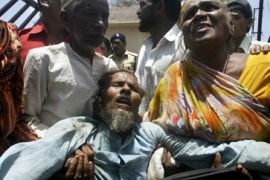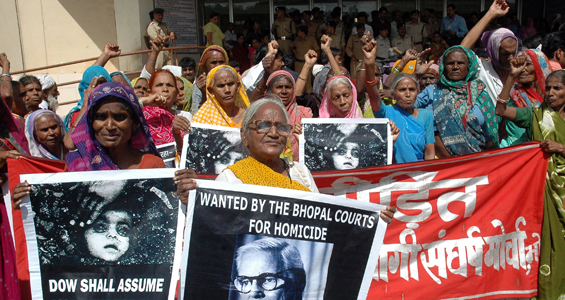Too little, too late for Bhopal
Families of victims of India’s 1984 gas leak that killed thousands say sentence not enough.

 |
| A court in India has sentenced seven ex-employees of Union Carbide to two years in jail after finding them guilty of negligence over a deadly gas leak that killed thousands in 1984 [AFP] |
Sanjay Verma was only five months old when a cloud of poison gas killed his parents and five siblings in Bhopal, India, as they slept in their beds.
His parents and siblings were among some 3,500 people who died immediately after the December 1984 gas leak while more than 15,000 others perished from the lingering effects of the world’s worst industrial disaster.
Keep reading
list of 4 items‘Mama we’re dying’: Only able to hear her kids in Gaza in their final days
Europe pledges to boost aid to Sudan on unwelcome war anniversary
Birth, death, escape: Three women’s struggle through Sudan’s war
On Monday, a court in Bhopal found seven ex-employees of the Indian unit of Union Carbide, the US company that owned the chemical plant, guilty of “causing death by negligence”.
They were sentenced to two years in jail, a penalty similar to those handed out for deadly traffic accidents, and ordered to pay fines of $2,100 each.
‘No option’
But for Verma, the victory provides little comfort, as Warren Anderson, Union Carbide’s former CEO, did not show up for court.
“In a sense I was lucky,” Verma said. “I was too young to see the bodies in the streets. I was lucky I didn’t know my parents.”
Monday’s ruling was the result of a court battle that dragged on for 23 years and came after Mohan P Tiwari, the chief judicial magistrate, reviewed testimony from 178 prosecution witnesses and the contents of 3,008 documents.
The convicted parties will likely appeal the verdict in India’s supreme court.
But the case against company officials is just one of several ongoing court battles surrounding the Bhopal disaster, which according to Indian government records, affected 578,000 people.
More than 25 years later, many are still grappling with its effects.
“About 30,000 people are still drinking contaminated water,” Karuna Nundy, a human rights lawyer in New Delhi who is representing victims on a pro-bono basis, said.
Nundy is arguing a separate case before India’s supreme court, trying to get better medical care for Bhopal’s victims.
“These are poor people who have no option but to drink the toxic water, even though they know how dangerous it is.
“There are children who have been born with chromosomal defects, who have terrible health care.”
Advice ignored
| in depth | |||||||||||
|
When the 25 tonnes of toxic methylisocyanate gas leaked from a storage tank, drifting into the streets of Bhopal and the homes of its 1.5 million residents, Nundy said “all six of the most important safety measures failed”.
“The siren that should have gone off to warn the surrounding populations did not go off.”
Union Carbide built the plant, which Nundy said had been leaking toxins into the local water supply and soil since 1977, in a densely populated urban area, despite the advice of its own experts.
On December 7, 1984, days after the disaster, Indian officials arrested Warren Anderson, but he was released on bail and allowed to return to the US.
Victims like Verma are enraged by the decision to allow Anderson to leave the country, but Nundy speculates that the Indian government may have feared that keeping him imprisoned would have discouraged foreign investment in the country.
In 1989, Union Carbide paid a $470mn settlement to the Indian government. But because the number of victims was so high, rights activists say each one received just about $1,000.
Union Carbide divested its stake in its Indian division in 1994 and a message on the company’s website says that it, and former chairman Anderson, “worked diligently to provide aid to the victims and set up a process to resolve their claims”.
It also attributes the gas leak to an act of sabotage.
But rights activists and lawyers say the claim is absurd and that it has been disproven in various courts.
Dow Chemical paid $12bn to acquire Union Carbide in 2001 and denies that it holds responsibility for the Bhopal disaster. Dow Chemical’s India division did not respond to Al Jazeera’s request for an interview.
Court battles
Bhopal survivors launched a class action lawsuit against Union Carbide in the US in 1999.
During court hearings in New York in 2002, internal Union Carbide documents were disclosed, showing the company was using “unproven technology” at its Bhopal plant.
But, the company did not use this “unproven technology” in its US operations.
In separate US litigation in 2002, Dow Chemical set aside $2.2bn to compensate American workers who were exposed to asbestos at Union Carbide operations, leading rights activists to accuse the company of attaching greater value to the lives of Americans than those of Indians.
In June 2009, Bhopal survivors secured the signatures of 27 members of the US congress, who wrote a letter to Dow Chemical asking the company to clean up toxic waste from the site.
“We request that Dow ensures that a representative appears in the ongoing legal cases in India regarding Bhopal, that Dow meets the demands of the survivors for medical and economic rehabilitation, and cleans up the soil and groundwater contamination in and around the factory site,” the politicians wrote in the letter to Dow Chemical’s CEO.
However, the company did not comply with these requests and survivors continue to fight court battles in India over rehabilitation and clean up.
“The toxic waste case is now before the high court of Madhya Pradesh [the state where Bhopal is located],” Nundy said.
“I am also arguing a case in which the supreme court is directing better medical care for the victims of the gas leak.”
After a series of delays and procedural issues, US litigation around the Bhopal disaster continues in a New York court.
Business as usual
Despite Monday’s guilty verdict, litigation surrounding the disaster will continue in other Indian courts.
Rights activists, however, worry that the Indian government and foreign multinationals will go on with business as usual.
As India’s economy grows quickly, the country has announced plans for a series of new nuclear power plants.
In May 2010, Bhopal survivors filed a right-to-information request with the Indian government, asking how it would deal with a nuclear accident.
According to an editorial in the Wall Street Journal, the Indian government plans to cap corporate liability at $100m with the next $400m to deal with potential nuclear disasters coming from Indian taxpayers.
Nundy said the government continues to send the wrong message – “we’ll set a cap for you and we’ll have the taxpayer pay for it” – to foreign companies doing business in India.
As Bhopal victims like Verma wait for the next round of litigation in the wake of this verdict, some Indian lawyers are pushing for structural changes in how the country does business with multinational corporations.
“If you have a lax regulatory system, as you do in many third world countries, then there is a race to the bottom because adherence to health and safety standards is not enforced,” Nundy said.
“There is less of a deterrent effect on companies to take safety seriously, to protect Indian lives. We need the same rule of law for everybody.”
The 19th century French philosopher Pierre-Joseph Proudhon once referred to laws as spider webs for the rich and chains for the poor. For many of the victims, those words prevail.
